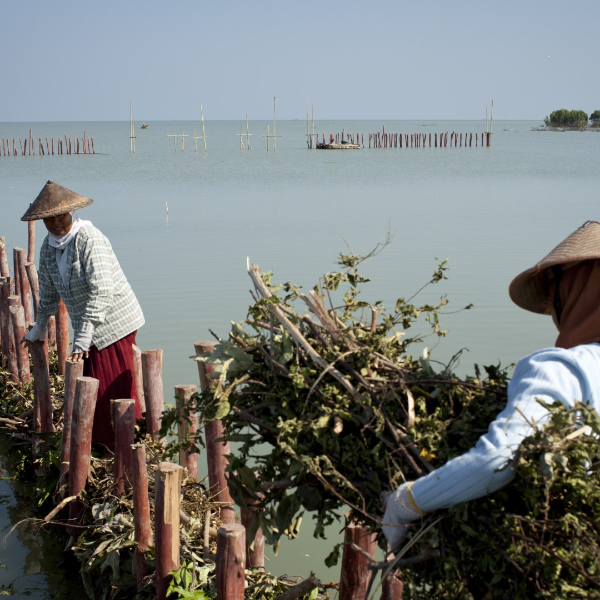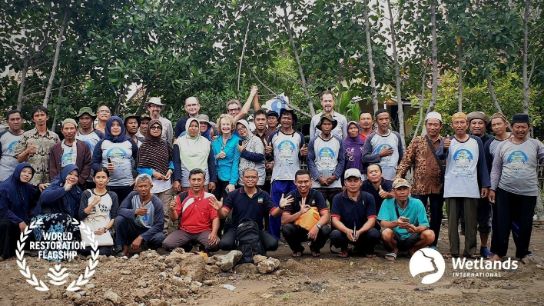UN recognises ‘Building with Nature Indonesia’ with special award

UN recognises ‘Building with Nature Indonesia’ with special award
Building with Nature (BwN) Indonesia, a project to naturally restore mangrove forests and prevent coastal flooding, has been recognised as a World Restoration Flagship Initiative, making it one of ten pioneering efforts to revive the natural world.
Building with Nature Indonesia is one of ten flagship projects that show the world how conservationists are helping to restore damaged ecosystems around the world. Human activities have significantly affected three-quarters of the Earth's land and two-thirds of its marine environment, wiping out one million species. Thanks to this recognition, the project will also be eligible for UN support, funding and technical expertise.
Witteveen+Bos is part of the unique public-private partnership with Wetlands International, Ecoshape, the Indonesian Ministry of Marine Affairs and Fisheries and the Indonesian Ministry of Public Works and Housing, Deltares, TU Delft, Wageningen University & Research, UNESCO-IHE, Blue Forests, Kota Kita, Von Lieberman, Diponegoro University and local communities in the various Building with Nature projects in Indonesia.

With local partners
Indonesia, an archipelago of 17,000 islands, is rich in mangrove forests – a haven for wildlife. In many places, however, mangroves have been cleared to make way for development and ponds for fish farming. The Building with Nature initiative is committed to restoring these forests. In Demak, a district on the island of Java, we have been working with the Indonesian government and other partners from local communities along the 20-kilometre-long coastline to regrow mangroves.
Rather than simply planting mangroves, the Building with Nature Indonesia project took the innovative approach of using semipermeable sea walls made from natural materials to trap mud and sediment. Mangroves then grow naturally, with a 70% survival rate – significantly higher than the 15-20% survival rate of planted mangroves. Over time, soil builds up around the roots of the mangroves, which can help to prevent rising seas from flooding communities.
Flagship initiatives
These efforts are helping to improve the resilience of 70,000 people to the effects of climate change. The project's experts have helped around 300 shrimp farmers build ponds that can coexist with mangroves and improve the sustainability of their operations. These farmers have seen their shrimp yields triple as a result of joint efforts.
Building with Nature Indonesia and the other flagship initiatives were selected as part of the United Nations Decade on Ecosystem Restoration, a global movement coordinated by the United Nations Environment Programme (UNEP) and the United Nations Food and Agriculture Organization (FAO). It aims to prevent and reverse the decline of natural areas around the world. The announcement was made during the meeting of world leaders in Montreal, Canada, at the UN Conference on Biological Diversity and Ecological Restoration.
Qu Dongyu, Director-General of FAO, said: ‘FAO, together with UNEP, as co-lead of the UN Decade on Ecosystem Restoration, is pleased to award the ten most ambitious, visionary and promising ecosystem restoration initiatives as 2022 World Restoration Flagships. Inspired by these flagships, we can learn to restore our ecosystems for better production, better nutrition, a better environment and a better life for all, leaving no one behind.’
Muhammad Yusuf, Director of Coastal and Small Island Management, Indonesian Ministry of Marine Affairs: ‘The Demak region is severely affected by climate change. Hundreds of thousands of hectares of land are disappearing. This method mimics the root system of the mangrove tree, so sediment can seep in. The seawater gradually recedes back into the sea. The tight growth of interlocking mangrove roots acts as a natural barrier to reduce the effects of erosion.’
More information?

